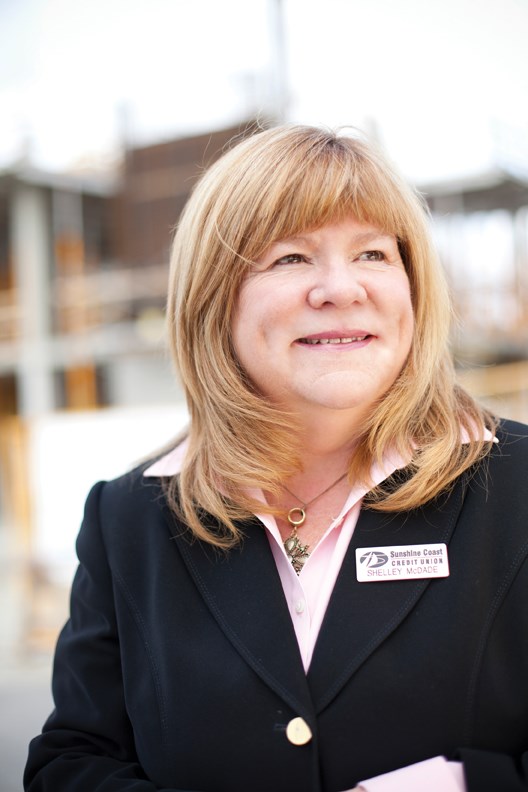The Sunshine Coast’s new, taxpayer-funded economic development body has set its sights on reducing economic disparity on the Coast within the next three to five years.
The Sunshine Coast Regional Economic Development Organization (SCREDO) strategic plan was made public at a Nov. 24 Sunshine Coast Regional District (SCRD) committee meeting. Councils in Sechelt and Gibsons will have the plan on their agendas in the coming weeks.
The new agency is set to receive $300,000 a year in funding from area governments under an agreement that’s still awaiting a final sign-off.
Shelley McDade of the Sunshine Coast Credit Union is chair of SCREDO’s nine-person board, which has been on the job since late March drafting the strategic plan and registering as a non-profit society.
McDade told Coast Reporter this week they settled on three goals they felt could be easily understood and where progress could be measured using data that’s readily available. The strategic plan acknowledges the difficulty of gauging whether economic development initiatives are working. “Performance measurement is a challenging topic in economic development due to the difficulty in distinguishing the impact of economic development activities among all the other factors that affect the local economy.”
Progress on the economic disparity goal, for example, will be measured by how the area ranks on the BC Statistics Economic Hardship Index. The Sunshine Coast was 22nd out of 26 regional districts in the 2012 index.
“There’s good research out in the world today that says the smaller the gap between the most affluent and the least affluent in a community, the better the quality of life … That’s the intention of aiming for that particular metric,” McDade said.
The other two goals are increasing the number of growing businesses, measured by the number of businesses on the Coast reporting growth, and increasing the number of quality career opportunities, measured by the number of businesses reporting increased employment opportunities with living wage jobs. (The current living wage on the Sunshine Coast has been calculated at just over $19 an hour.)
SCREDO’s strategic plan sets out three programs to achieve the goals, and McDade said the key one to start will be business retention, expansion and attraction (BREA), which she described as a “pretty aggressive” plan that’s built on “action on the street with current businesses.”
“The very first thing you do is take care of everyone on the home front, and make sure they’ve got the tools and access that they need to be as successful as possible so they can stay and potentially expand,” McDade said. “If you’re doing a good job with that, frankly, that’s where economic development will come from.”
As well as the strategic plan, SCRD directors discussed SCREDO’s proposed code of conduct and constitution and bylaws at the Nov. 24 meeting.
The only area of concern was a clause in the code which seems to leave the door open to SCREDO board members doing paid work for the agency: “A director, officer, employee or volunteer should not engage directly or indirectly, as a director, officer, employee, consultant, partner, agent or major shareholder in any business or undertaking that competes with, does business with or seeks to do business with the organization except with the express written approval of the executive director, in the case of an employee, or … the chair of the board of directors or the chair of an appropriate committee … in the case of an officer or director.”
Lorne Lewis of Elphinstone said that door needs to be closed. “I don’t believe there should be any exceptions to conflict of interest [policies],” he told the committee.
Sechelt director Darnelda Siegers and Pender Harbour’s Frank Mauro also said they weren’t comfortable with the wording. But Mauro, who chairs the committee, noted it’s a work in progress and SCREDO is expected to make changes.
McDade confirmed they will be tweaking that wording to address the concerns.
“The board is very aware of the necessity for transparency and ensuring we deploy these taxpayer dollars in a very fair and equitable way,” she said.
McDade also said SCREDO will likely start looking for staff early next year (recent ads from a recruiting firm for a CEO and economic development officer are actually for positions at the shíshálh Nation’s Tsain-Ko Development Corporation), but the board hopes to start tackling the to-do list in the strategic plan before the end of the year.
“I can’t say enough about the eager participants on the board and their willingness to bring their talent and their time to the table, and they’ve already done a tremendous amount of that,” said McDade. “We’re going to be the ‘engagement agents’. We’re probably going to be the ones who are getting out and speaking to the businesses, and holding the events, and doing the communicating. It’s going to be busy.”



